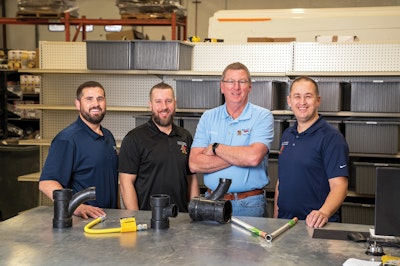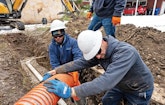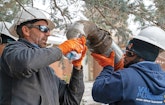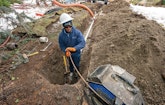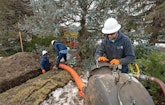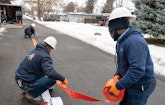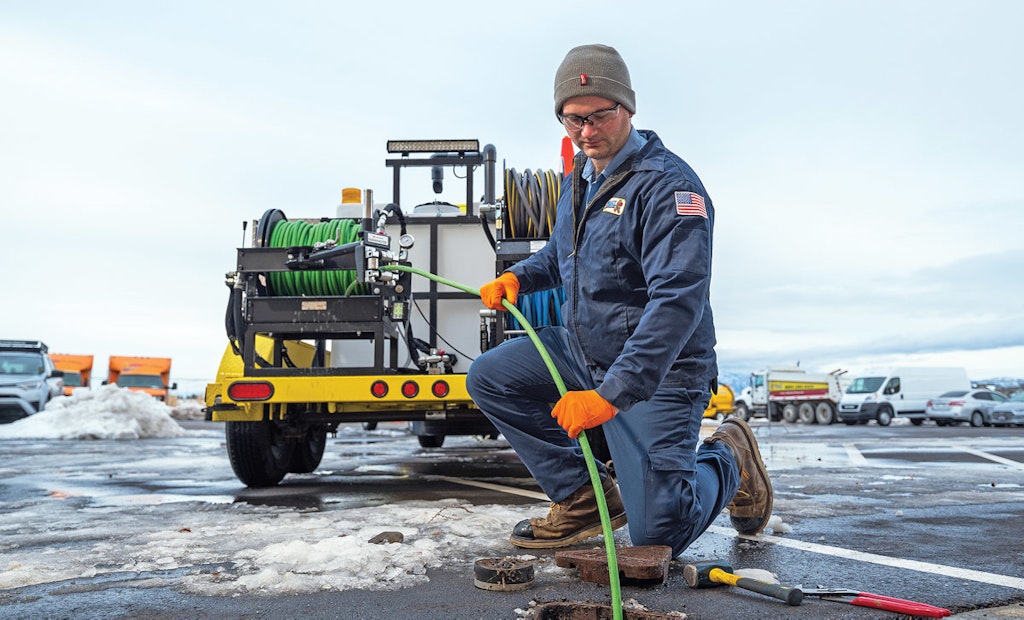Interested in Relining/Rehab?
Get Relining/Rehab articles, news and videos right in your inbox! Sign up now.
Relining/Rehab + Get AlertsMany a drain cleaner or plumber will concede they’re better craftspeople and technicians than they are business people. Lawrence Snow is not one of them.
Before Snow and his son, Rob, established Valley Plumbing and Drain Cleaning in suburban Salt Lake City in 2010, he worked for years as a business coach for Quality Service Contractors, a nonprofit group owned by the Plumbing-Heating-Cooling Contractors National Association.
As a result, Snow entered the business arena with plenty of intel about the inner workings of companies and best practices for success.
“As a coach, I got a lot of good ideas from people all over the country,” says Snow, 64. “It really helped out in a lot of areas, like how you treat employees, for example. I learned you have to invest heavily in employees and treat them well all the time — not just at Christmas.”
The company spends $30,000 a year on parties for employees and other activities, things like group breakfasts where the owners cook, renting out family fun centers for employees and their families, holding barbecues at the office, visits from food trucks, bringing lunch to field employees and renting out VIP boxes at sporting events, Snow says.
“These events make our employees feel like they’re not just workers, but are part of a family and that there’s more to working here than just the job. It also brings their families closer to the company.”
The years of business coaching, coupled with the experience gleaned while working at other companies, has yielded solid results for Valley Plumbing, which eventually brought in Snow’s other son, Corry, a certified public accountant, and his son-in-law, Brett Reeves, as minority owners.
The West Jordan-based company, which does residential and commercial service and repair, drain cleaning and trenchless pipeline rehabilitation, generated nearly $10 million in gross revenue in 2021, Snow says.
That compares to about $280,000 in revenue during the company’s first year in business.
“I think we’re getting there,” Snow says wryly. “It’s been fun watching it grow.”
Entrepreneurial spirit
As a young man in St. George, Utah, Snow started out his career in 1976, working for a neighbor that owned a plumbing business. After that, he moved to Las Vegas and worked for a couple more companies before buying a plumbing business and running it from 1982 to 1999, when he sold it.
Snow’s next career stop was Mr. Rooter, where he served as a vice president of business development for about 2 1/2 years before becoming a business coach for Quality Service.
During that coaching stint, Snow also established Valley Plumbing, which was operated by Rob. When the company grew large enough that Rob could no longer handle the operations by himself, Snow came on board, he says.
“My thought was if it didn’t work out, my coaching career still was in fine shape,” Snow says. “But I like being an entrepreneur — it’s in my blood.
“I like to see my employees succeed; that’s what really drives me. It’s kind of cool when they tell you they’re buying a new house or a new car.
“Decades ago, I might’ve thought I was paying employees too much if they could afford to buy a new truck. But over the years, I woke up and realized that if you take care of your employees, they’ll take care of you.”
Putting people first
Rob Snow says several different strategies have contributed to the company’s growth. One is putting employees and customers ahead of profits.
“At so many seminars out there, all they talk about is profits, profits, profits,” he says. “But you have to put customers and employees first. If you don’t, people see right through that. No one wants to work for someone that’s only interested in padding their own pockets.
“But if you put employees and customers first, the profits will follow. We always tell our guys that if they stop chasing money, money will start to chase them.”
A professional approach and appearance also is critical. That’s why technicians wear uniforms and the company invests in newer vehicles with attractive vinyl wraps, he says.
“We want to look like a professional company,” Snow says. “People want to see what they’re paying for. When uniformed technicians show up in newer trucks, customers feel confident they’re going to receive a high level of service that matches that professional appearance.”
He also says the company’s singular focus on doing one thing and doing it well has paved the way for success.
“We haven’t been tempted with the million other things that some service companies want to do, like heating, air conditioning and electrical work. We’ve decided we’re simply going to be the best at plumbing and only plumbing.”
Even if that means the company leaves revenue opportunities on the table that other contractors grab instead.
“But we think customers would rather have a master of one trade than a jack of all trades,” he says.
Leading the pack
Taking calculated risks also spurred growth, such as diversifying into trenchless pipeline rehab about eight years ago. A friend who had decided to leave that service sector offered to sell his pipe lining equipment to Snow at a drastically discounted price.
“We were at a point where we wanted to take things to the next level,” Snow says. “We’ve always been the leader of the pack so it made sense to become one of the first to do trenchless work in Salt Lake City. We worked with municipalities in the area to get it listed as an approved pipeline rehab technology. It added significantly to our bottom line.
“When you screw up lining pipes, you screw up big time,” he continues. “But when you win, you win big — and I’d say that more than 95% of the time, things go like clockwork.”
Resourcefulness is another Snow trademark. When he and Rob couldn’t get manufacturer’s training because the system was purchased used, they watched a YouTube video to figure out how to install liners.
“Now we line a pipe almost every day, mostly more than 100-foot-long runs that are 9 feet deep,” he says. “The profit margins are great.”
Diversification dividends
The ability to provide pipe lining services for customers is invaluable. For starters, the company keeps revenue in-house that it otherwise would pay out to subcontractors.
“Once you refer a customer to another company, you might never hear back from them again,” Snow says.
Providing pipe lining services also gives Valley Plumbing more control over project timelines and quality, he says.
“Plus it gives people more options.”
The company owns a liner inversion machine made by Perma-Liner Industries and a Quik-Shot lateral lining system that was made by Quik Lining Systems and sold by Pipe Lining Supply.
To provide additional trenchless rehab services, the company also invested in a HammerHead Mole pneumatic piercing tool for replacing water service lines.
The company also owns about five dozen cable drain machines made by General Pipe Cleaners (a division of General Wire Spring Co.): Mini-Rooter XPs for 2- to 4-inch-diameter drainlines, Speedrooter 92s for 3- to 10-inch lines and hand-held Super-Vees for 1 1/4- to 3-inch lines.
In addition, Valley Plumbing has invested in six water jetters made by HotJet USA (two trailer-mounted and four truck-mounted); about 28 RIDGID SeeSnake Mini inspection cameras; 28 RIDGID NaviTrack Scout line locators; six RIDGID SeekTech ST-305 line transmitters for tracing pipes; and one Gen-Ear leak-locating machine from General Pipe.
The company runs 24 service vehicles, mostly RAM ProMaster and Freightliner Sprinter vans. Each truck is identically outfitted with a bin-and-shelf system from J&M Commercial Van Outfitting. Having the same parts in the same numbered bins, for example, helps maintain efficiency when the company’s 18 apprentices hop from truck to truck, Snow says.
The company also owns several excavating machines: a 580 wheeled backhoe built by CASE (a brand owned by CNH Industrial America), two mini-excavators manufactured by SANY Heavy Industries and a mini-excavator made by Kubota.
Keys to success
Several factors have played a role in the company’s growth and success. One is the addition of Corry Snow, who serves as the company’s chief financial officer, and Reeves, whose role as vice president of logistics includes fleet, inventory and shop management.
Another key to success: Snow and his son lead by example by pitching in on job sites.
“I’m the first one in the ditch,” Snow says. “Nothing is below me. If I had my choice, I’d be on an excavation crew all day, having some fun. Plus it helps develop rapport with employees and lets them see your personality.
“The biggest complaint I heard while business coaching was that bosses aren’t approachable. I’d say that 80% of the problems companies have stem from owners that have no clue about what’s happening out in the field — and they’re poorer for that.”
A few other insights Snow has gleaned over the years: Make accounting and knowledge about company finances a top priority; share the wealth with everyone; and always hire people that are smarter than you.
“I’ve always lived by those three principles and have been very successful because of it,” he says.
Furthermore, Snow recommends that company owners hire a competent company to do marketing.
“Most people suck at it,” he says. “They just throw money out the window and hope something works. Stick with what you’re good at and don’t dabble in the other crap.”
Developing future plumbers
Rob Snow says that a primary emphasis in the years ahead will be recruiting high school graduates for careers in plumbing.
“We’ve come to the conclusion that good plumbers just aren’t out there looking for work — they’re already working,” he says. “We can’t rely on other companies to train the next plumbers for us.
“So we’ve doubled down on training our own next generation. We’ve pretty much hired an apprentice for every plumbing truck and we train them from the ground up. These days, the only way to find new plumbers as older plumbers retire is to find kids right out of school and take that financial risk of training them from the ground up — and hope like heck they stick around.”
But with a chronic labor shortage crippling the industry, that’s easier said than done. One good solution has been to ask customers if they know someone who’s mechanically inclined and looking for a job.
“Sometimes customers will mention that they wish their son or daughter, or even a grandchild, could find a job,” he says. “So our technicians are trained to ask right way if they’re good with their hands. We also try to target military veterans by putting job ads at the local Veterans Affairs centers.”
The elder Snow winnows out job candidates by asking a few pointed questions.
“I always ask them if they change the oil on their vehicles,” he says. “If they do, I want to keep talking to them because that means they’re mechanically inclined.
“I also ask random questions, like what video games do you like to play, whether or not they like to wear a hat, or do they prefer pencils to pens or flip-flops to shoes. I couldn’t care less about the answers. I just want to see how fast they respond and how quick they can think on their feet.”
Growing naturally
Looking ahead, Snow says the company will keep striving to be a market leader and take an aggressive stance on investments in new productivity- and profitability-enhancing technology.
“I’m not the kind of guy who waits to make the first move,” he says. “I want to be that company that everyone else is trying to catch up to.”
But Snow says he prefers organic growth while also maintaining profitability along the way.
“We don’t want to push, push and push,” he explains. “Too many companies try to be the biggest in town and it bankrupts them. I believe that when a business is ready to grow, let it grow naturally versus forcing it. And that’s been a very successful formula for us.”
